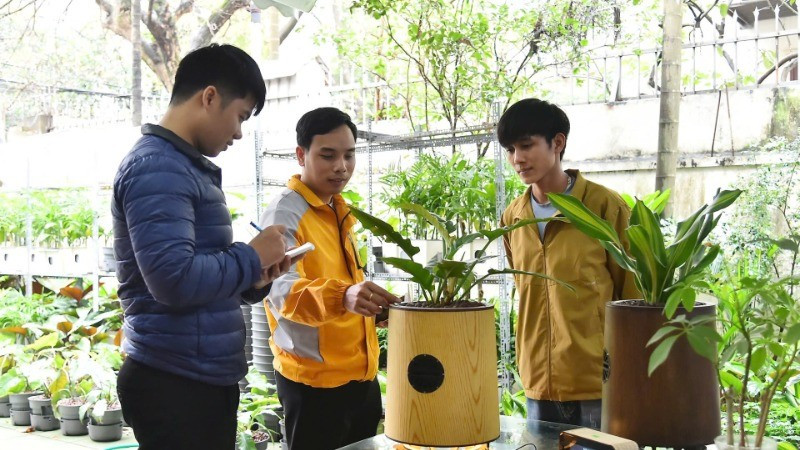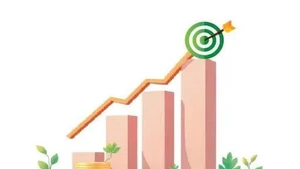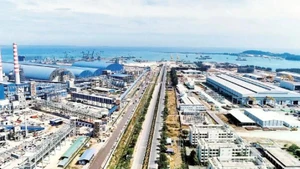Vietnamese green tech reaching out to the world
According to forecasts by Fortune Business, the global green technology market could grow by 22.4% annually between 2024 and 2032. The green finance market is expected to surpass 53 trillion USD by 2025, while the green materials market is forecast to reach 1.199 trillion USD by 2032. These figures reflect a surge in investment in environmentally friendly technologies and solutions, presenting significant opportunities for nations, businesses, and pioneering start-ups.
In Vietnam, many of the green tech products developed by start-ups are not only meeting domestic demands but also gradually expanding into international markets thanks to their eco-friendly features. Many green technology solutions have emerged from the National Innovative Technopreneur Contest (TECHFEST), which not only honours start-ups but also provides a platform for experimentation, capability affirmation, and readiness for global integration.
In Vietnam, many of the green tech products developed by start-ups are not only meeting domestic demands but also gradually expanding into international markets thanks to their eco-friendly features.
The agricultural sector has witnessed the strongest development of green start-ups. A series of start-ups have shown their ability to shift production models towards environmentally friendly and highly sustainable practices.
The agricultural sector has witnessed the most robust development among green start-ups. A series of start-ups have demonstrated their capacity to transition production models towards environmentally friendly practices with high sustainable value. Enfarm Agritech, which won second prize at TECHFEST 2024 and was named among the top 15 outstanding solutions at the Vietnam Innovation Challenge (VIC) 2024, stands out as a prime example of digital agriculture.
Enfarm’s smart nutrition measuring device uses IoT and AI to analyse four elements: soil, water, crops, and fertiliser. It provides farmers with insights into crop nutritional needs. Enfarm has addressed one of the biggest global agricultural issues — 60% of fertilisers are not absorbed by crops, resulting in USD 120 billion in annual losses, degradation of one-third of arable land, and 5% of total global greenhouse gas emissions.
Although established just under two years ago, Enfarm's smart nutrition device has quickly been adopted by farmers domestically, especially in the Central Highlands and Southeast Vietnam. The product is already present in international markets, and has notably been put to use in a 30,000-hectare coffee cultivation project in the Philippines.
BUYO Bioplastic JSC — the champion of TECHFEST 2023 — introduced an innovative solution: biodegradable packaging made from sugarcane pulp and organic materials. BUYO has achieved strict certifications required by demanding markets such as Europe and the US. Its bioplastic products have entered sustainable supply chains of major corporations like AB InBev, Kikkoman, and Bidfood.
Both Enfarm and BUYO are among the six Vietnamese start-ups selected for support under the P4G (Partnering for Green Growth and the Global Goals 2030) Summit 2025. This prestigious international initiative aims to foster green transition and global sustainable growth.
According to the Department of Start-ups and Technology Enterprises (Ministry of Science and Technology), the renewable energy sector has seen the emergence of technologies supporting sustainable energy systems based on renewables. These include large-scale energy storage systems solving the critical issue of surplus energy storage, and passive cooling paint that significantly reduces building temperatures without electricity use, cutting greenhouse gas emissions. These highly applicable solutions are scalable and support the long-term goal of carbon neutrality.
Some start-ups have also pioneered the application of digital solutions, artificial intelligence, blockchain, and data management to optimise efficiency, reduce operating costs, and cut greenhouse gas emissions in logistics. Companies such as Abivin, Otrfy, and Hubtech are helping to build a green logistics ecosystem.
These solutions are considered climate technologies as they aim to reduce greenhouse gas emissions, adapt to climate change impacts, and facilitate the transition to a low-carbon economy. The report “Climate Tech Start-up Investment in Vietnam 2024” by New Energy Nexus and Clickable Impact reveals that from 2015 to 2023, 49 climate tech start-ups in Vietnam received investment totalling USD 92.6 million.
More than 65% of these start-ups are based in Ho Chi Minh City, and 26.5% in Hanoi, highlighting the link between green innovation and major economic centres. Notably, investment in climate tech start-ups grew by an average of 365% annually between 2021 and 2023. The sectors attracting the most investment include sustainable agriculture and food technology (48.4%), sustainable transport (40%), circular economy and carbon recovery (6%), energy transition (3.6%), and construction infrastructure (1.8%). These figures underscore the rapid growth of climate tech start-ups in Vietnam and suggest that sustainable agriculture, green transport, and circular economy are becoming investment focal points.
Public Sector Market Needs to Lead Green Growth
However, many start-ups face major obstacles during their growth phase. According to the Department of Start-ups and Technology Enterprises, challenges for green start-ups include a lack of tailored support policies, difficulties in accessing capital, and limited availability of human resources specialised in environmental technology and sustainable governance. Additionally, consumers are not yet ready to pay more for green products, and green standards are still uncommon in supply chains.
Many green start-ups report that the biggest challenge is accessing public sector markets. While the private sector actively seeks out technological partners to accelerate adoption, green start-ups often encounter delays when working with state-owned enterprises, especially in research, cooperation, and procurement.
The state has not yet established a legal framework for new and environmentally friendly materials and technologies.
Moreover, the state has not yet established a legal framework for new and environmentally friendly materials and technologies. Procurement regulations need to be revised to consider not only price and experience but also innovation. There should also be a "sandbox" mechanism for certifying the quality of new technological products, which can often lack existing standards or inclusion in current technical catalogues.
Do Hong Hanh, Director of BUYO Bioplastic JSC, recommends that the government further develop and implement stronger policies to promote the use of environmentally friendly new materials. There should be better linkage and support between solution providers and businesses that need these products. For example, consider completely banning conventional plastics in sectors with significant environmental impact, or setting minimum requirements for recycled and biodegradable content in products. Public sector procurement should prioritise green materials, and new material technologies should be added to the list of science and technology development priorities.
Hanh also hopes that draft policies by the Ministry of Agriculture and Environment concerning Extended Producer Responsibility (EPR) — particularly exemptions for eco-friendly materials from EPR fees — and policies on eco-design will encourage consumers to choose green materials. In the context of volatile export markets, developing a sustainable domestic market through improved green tech policies is crucial.
Nguyen Do Dung, Co-founder and CEO of Enfarm Agricultural Technology Co., Ltd., believes that the public sector should lead in adopting and using domestic technologies. Currently, Enfarm mainly sells directly to farmers and private enterprises. Meanwhile, state-owned companies — despite holding the majority share in industries like agriculture and fertilisers — are slow to adopt such technologies due to procedural hurdles in collaboration and procurement.
The reason Enfarm’s product has been well received in the Philippines is thanks to the proactive involvement of the local government. Dung proposes that regulatory agencies, especially the Ministries of Agriculture and Environment, pilot and provide advise on using effective technological platforms as agricultural extension tools to improve productivity and reduce environmental impact. The government should launch projects on technology, carbon credits, or clean agriculture to create opportunities for green start-ups to participate.
Furthermore, current green credit and tax incentives remain largely symbolic. Many start-ups note that although banks offer green credit packages, the lending conditions, interest rates, and procedures are almost identical to conventional loans. Tax incentives for green technology products are also vague.
Green start-ups are hopeful that a strong national commitment to investing in science and technology will open major opportunities for their development in the near future. To ensure that green start-ups become a key driver for sustainable growth, Vietnam must adopt a robust development strategy, create a clear legal framework, and provide timely support for start-ups in the green tech sector.
















